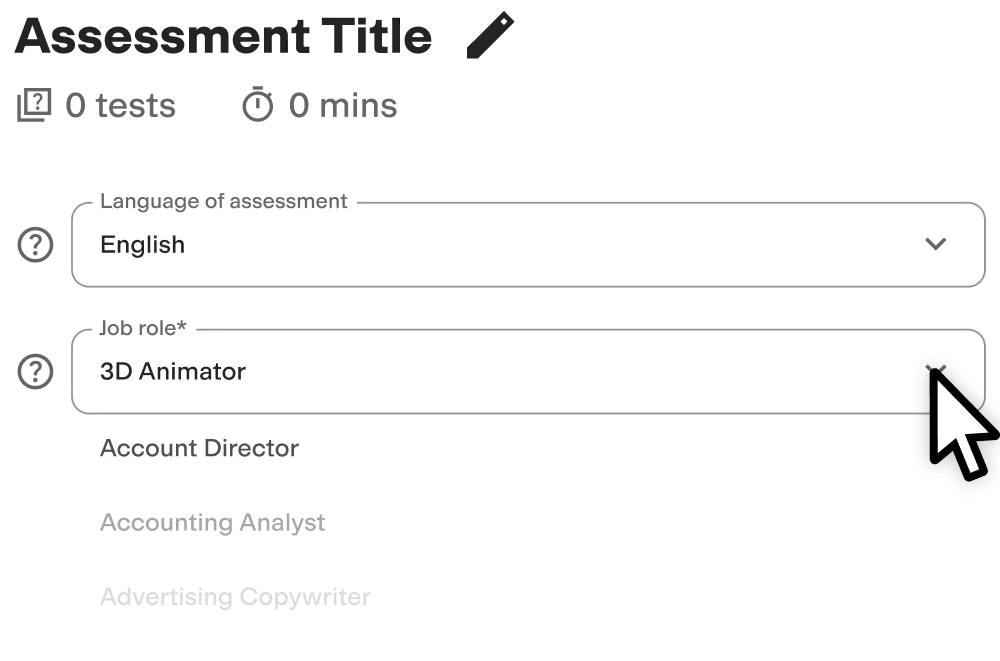VMware test
Summary of the VMware test
This VMware test evaluates candidates’ technical competency and familiarity with VMware vSphere, virtual machines, and related technologies. This screening test will help you hire VMware virtualization experts to improve your cost and efficiency.
Covered skills
VMware and Virtualization
Virtual Machine Management
vCenter and ESXi management
Virtual Networking and Storage in vSphere
Use the VMware test to hire
System Administrators, System Engineers, Virtualization Engineers, DevOps Engineers, IT Officer, Infrastructure Engineers, and other roles that require a strong grasp of VMware.
About the VMware test
Modern businesses are increasingly relying on virtualization rather than bare-metal servers for their workloads. By creating virtual machines on their existing hardware, businesses effectively create new machines without hardware investment, thus reducing capital and operational costs, minimizing downtime, and improving resource management. With an expert in VMware on staff, you can take full advantage of the benefits of virtualization.
This VMware test evaluates candidates’ abilities to understand and apply VMware and virtualization concepts and manage vCenters, VMware ESXi, and virtual machines. It also evaluates their ability to effectively use virtual networking and storage in vSphere.
This screening test will help you identify VMware experts who have the capacity to implement, manage, and troubleshoot vSphere infrastructure to ensure that your virtual machines run smoothly and efficiently, and are configured to best meet your business needs. Candidates who do well on this VMware test will have a clear understanding of the VMware infrastructure and its usage in practical environments.
The test is made by a subject-matter expert
TestGorilla’s tests are created by subject matter experts. We assess potential subject-matter experts based on their knowledge, ability, and reputation.Before being published, each test is peer-reviewed by another expert, then calibrated using hundreds of test takers with relevant experience in the subject.
Our feedback mechanisms and unique algorithms allow our subject-matter experts to constantly improve their tests.
Geeth Nuwan P.
Geeth Nuwan is a VMware Certified Professional who has worked in visualization, Cloud technologies and IT infrastructure at an enterprise level for more than seven years. His proven experience in implementation, management and troubleshooting IT infrastructure led him to his current role as a Senior Virtualization Engineer.
He holds a Bachelor's Technology Networking degree and is reading for his Master's degree at Kingston University, UK. In his free time, he enjoys traveling by motorcycle.
Use TestGorilla to hire the best faster, easier and bias-free
Our screening tests identify the best candidates and make your hiring decisions faster, easier, and bias-free.
Create high-quality assessments, fast
Building assessments is a breeze with TestGorilla. Get started with these simple steps.
What is a VMware online test? How will it help you?
An online VMWare test is a pre-employment skills assessment that helps you evaluate your candidates’ competency in testing applications, running several applications, and operating workloads on one server.
If you haven’t discovered skills testing, you may have noticed that hiring VMware professionals can be slightly tricky. There are various VMware skills, and they all need to match your role and business.
You may already know that having capable VMware experts on your team can stand your business in good stead. When a VMware pro joins your team, you can handle resource management with a virtual machine and use all virtual machines on their operating systems. You can create a new machine while mitigating the expenses linked to investing in hardware and reducing the downtime business experience without VMware tools and skills.
Nonetheless, getting these skilled applicants onboard your team and assessing their abilities may be difficult for various reasons. How can you make it simpler to recruit fairly and without unconscious bias? What is the most effective method to select top candidates from limited candidate pools? What if your applicants are equally matched regarding their VMware knowledge and experience? Our VMware online test was designed to meet all these challenges.
This VMware online test offers you fair recruitment and objective hiring. By integrating this VMware assessment test, you’ll solve the major hiring difficulties associated with traditional recruitment methods. You’ll never have to hire on a hunch or gut feeling as this VMware test will evaluate four fundamental VMware subskills and give you statistics for every VMware professional who completes the test. Even if your VMware professionals appear equally matched, this test will tell you who has the superior talent.
Discover whether your VMware applicants have these 4 essential skills
If you don’t have technical expertise, you may be puzzled trying to figure out how to assess your applicants’ VMware skills. But our test will help you end the confusion. Subject-matter experts created this test to evaluate the following four VMware subskills:
• Proficiency and understanding of virtualization in VMware: Incorporating this test into your recruitment process, you can find out whether your applicants’ server virtualization knowledge is up to the necessary standards and determine if they understand how to run various operating systems and apps on one device.
• Expertise in management of virtual machines: You will also discover if your applicants can create and manage virtual machines that belong to hosts or clusters and make resource administration simpler. And the test assesses whether applicants understand how to enhance and streamline operations.
• Expertise in management of the vCenter and knowledge of ESXi: A third skill evaluated by the test is your applicants’ vCenter and ESXi knowledge: It determines if your candidates understand the vCenter server and whether they can use this centralized management application to manage virtual machines. You can also assess whether applicants understand the ESXi hypervisor and how it functions with vSphere.
• Proficiency in vSphere storage and virtual networking: Using the vSphere software storage platform is another skill this VMware online test will help you assess. Learn whether your applicants understand the many storage model categories and how to use them, including distributed and traditional storage, and find out if your candidates understand the storage policies when using vSphere.
TestGorilla’s experts champion unbiased hiring. That’s why our peer-reviewed assessments, including the VMware online test, provide the ultimate data-driven approach to hiring VMware professionals and assessing their skills. When completed, the test will give you three kinds of data for reviewing candidates objectively: The star rating, the timing rating, and the performance percentage.
Why should you select this VMware online test?
This VMware knowledge skills assessment has the following advantages that make the hiring process far more convenient than resume screening:
• Minimize the cost of your recruitment process by avoiding mis-hires: VMware professionals are hard to find – especially those with the right skills that align with your business. The VMware test facilitates the recruitment process, making it shorter and more efficient and reducing the cost by cutting out the need for time-consuming resume screening and providing you with quick and accurate data on your candidates’ skills. Most importantly, it helps you avoid mis-hires while reducing unconscious bias as well.
• Assess skills from a technical vantage point no matter your understanding of VMware: Senior-level VMware experts and skills are more difficult to assess if your technical understanding doesn’t equal theirs. But with the VMware online test, you can evaluate high-level candidates even as a non-technical recruiter. Assess applicants on virtualization, virtual machines, VMware infrastructure, and how to use it practically from a technical vantage point, no matter your skills.
• Reduce hiring complexities even after receiving hundreds of capable VMware applicants: You may be surprised about the number of applicants you receive in response to your VMware job advertisement. Reviewing hundreds of applicants is especially tricky and time-consuming with resume screenings. But our VMware online test eliminates the never-ending resume screening process and focuses on the demonstrable skills of your candidates.
Our tests are the chosen favorites of increasing numbers of organizations – 6,000+ businesses, including H&M, Publicis Groupe, and technicolor. Make this VMware online test part of your candidate selection process and see how unbiased hiring and technical skill assessment can lead you to the best candidates.
FAQs
View a sample report
The VMware test will be included in a PDF report along with the other tests from your assessment. You can easily download and share this report with colleagues and candidates.







